Are you planning to buy a property in Singapore? If so, you will need to understand the Loan-to-Value (LTV) Ratio. This is a critical factor that lenders use to decide how much money they can lend you. In simple terms, the LTV ratio is the percentage of the property value that you can borrow from the bank. The higher the LTV ratio, the higher the loan amount you can borrow.

In Singapore, the Monetary Authority of Singapore (MAS) sets the LTV limits for different types of properties. These limits vary based on the property type, tenure of the loan, and the borrower’s age. The LTV limits for HDB loans are different from those for private property loans. You should also note that the LTV limits are subject to change, and you should check with your bank or financial advisor for the latest information.
Understanding the LTV ratio is critical as it can impact your loan amount, loan tenure, and interest rates. A higher LTV ratio means a higher loan amount, but it also means higher interest rates and a shorter loan tenure. On the other hand, a lower LTV ratio means a lower loan amount, but it also means lower interest rates and a longer loan tenure. Therefore, it is essential to calculate your LTV ratio before applying for a loan to ensure that you can afford the loan repayments.
Key Takeaways
- The LTV ratio is the percentage of the property value that you can borrow from the bank.
- The MAS sets the LTV limits for different types of properties, and these limits vary based on the property type, tenure of the loan, and the borrower’s age.
- Understanding the LTV ratio is critical as it can impact your loan amount, loan tenure, and interest rates.
Understanding Loan-to-Value (LTV) Ratio
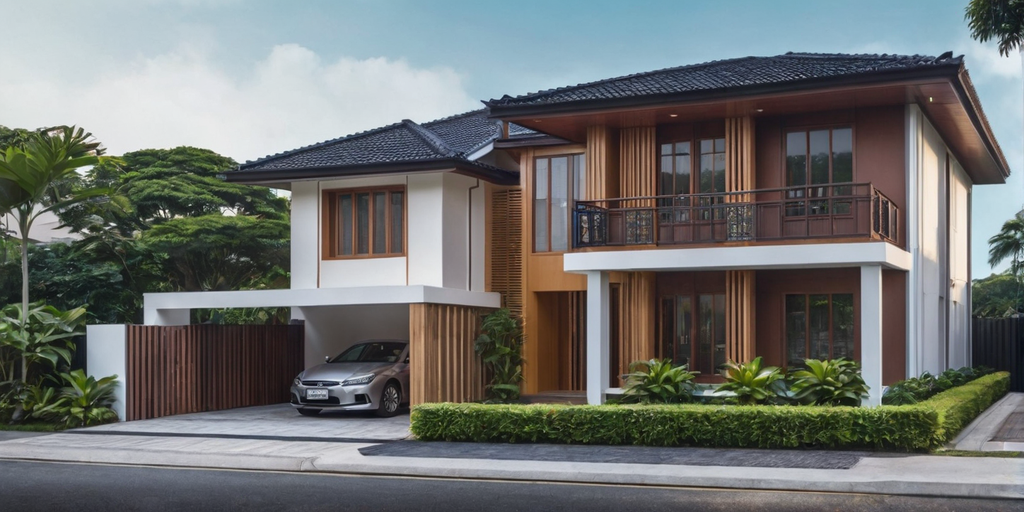
If you are looking to purchase a property in Singapore, it is essential to understand the Loan-to-Value (LTV) ratio. The LTV ratio is the amount of money you can borrow from a financial institution to purchase a property as a percentage of the property’s value. In other words, it is the ratio of the loan amount to the value of the property.
Definition of LTV Ratio
The LTV ratio is a critical factor in determining the amount of money you can borrow for a property purchase. The ratio is calculated by dividing the loan amount by the property’s value. For example, if you want to buy a property worth SGD 1,000,000 and the LTV ratio is 80%, you can borrow up to SGD 800,000 (80% of SGD 1,000,000) from a financial institution.
Importance of LTV in Property Purchases
The LTV ratio is an essential factor in property purchases because it determines the amount of money you can borrow from a financial institution. The higher the LTV ratio, the more money you can borrow, but it also means that you will have a higher debt-to-equity ratio, which can be risky.
A lower LTV ratio means that you will need to put down a higher down payment, which can be a challenge for some buyers. However, a lower LTV ratio also means that you will have a lower debt-to-equity ratio, which can be beneficial in the long run.
It is also important to note that the LTV ratio can vary depending on the type of property you are purchasing. For example, if you are purchasing a HDB flat, the LTV ratio is generally lower than if you are purchasing a private property.
In conclusion, understanding the LTV ratio is crucial when it comes to purchasing a property in Singapore. It is important to find a balance between the amount of money you can borrow and the debt-to-equity ratio to ensure that you make a sound financial decision.
LTV Regulations in Singapore
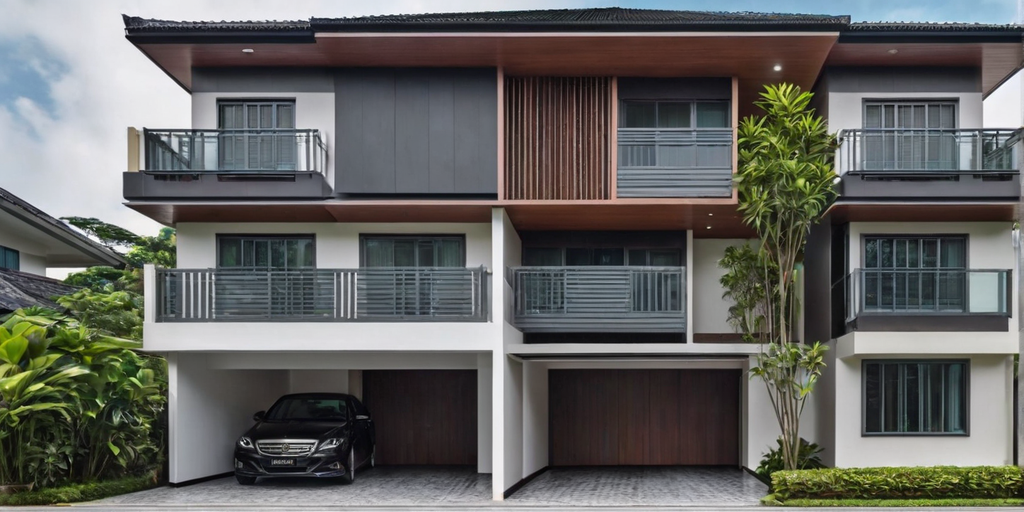
If you are planning to purchase a property in Singapore, you need to be aware of the Loan-to-Value (LTV) ratio regulations. The LTV ratio determines the maximum amount of funds you can borrow from a bank or HDB to purchase a property. In this section, we will discuss the LTV regulations in Singapore.
Monetary Authority of Singapore (MAS) Guidelines
The Monetary Authority of Singapore (MAS) sets guidelines for LTV ratios. These guidelines apply to all financial institutions in Singapore. According to the MAS guidelines, the maximum LTV ratio for a property loan is 75% for bank loans and 85% for HDB loans. However, the LTV ratio for non-HDB properties may differ based on the type of property.
Loan-to-Value Limits for Various Property Types
The LTV ratio limits for different types of properties in Singapore are as follows:
HDB Flats
If you are purchasing an HDB flat, the maximum LTV ratio is 85%. This means that you can borrow up to 85% of the purchase price or valuation of the flat, whichever is lower.
Executive Condominium
For an Executive Condominium (EC), the maximum LTV ratio is 75%. However, if the EC unit is a resale unit, the maximum LTV ratio is 55%.
Non-HDB Properties
For non-HDB properties, the maximum LTV ratio varies based on the type of property. The table below summarises the LTV ratio limits for different types of non-HDB properties:
| Property Type | Maximum LTV Ratio |
|---|---|
| Completed private residential properties | 75% |
| Non-landed properties under construction | 70% |
| Landed properties under construction | 60% |
| Commercial and industrial properties | 60% |
It is important to note that the LTV ratio limits are subject to change based on the prevailing market conditions and government policies.
In summary, the LTV ratio regulations in Singapore are set by the MAS and apply to all financial institutions. The maximum LTV ratio for bank loans is 75%, while HDB loans have a maximum LTV ratio of 85%. The LTV ratio limits vary based on the type of property, with non-HDB properties having different limits for completed and under-construction properties.
Calculating Your LTV Ratio

Calculating your Loan-to-Value (LTV) ratio is a critical step in determining the maximum amount you can borrow for your property financing. It is a percentage of the loan amount compared to the property’s value. The formula to calculate your LTV ratio is:
Loan amount ÷ Property value = LTV ratio
Factors Affecting LTV Calculations
Several factors affect LTV calculations, including the type of property, the loan tenure, and the borrower’s age. For HDB flats, the maximum LTV ratio is 90%. For private properties, the maximum LTV ratio is 75%. The loan tenure also affects the LTV ratio, with a maximum of 75% for loan tenures of up to 30 years and 55% for loan tenures exceeding 30 years. The borrower’s age also impacts the LTV ratio, with a lower LTV ratio for borrowers aged 65 and above.
Impact of Borrower’s Age on LTV
Your age affects the LTV ratio because the older you are, the less time you have to repay the loan. As a result, the LTV ratio decreases as you get older. For example, if you are below 55 years old, you can borrow up to 75% of the property value. However, if you are 65 years old or above, the maximum LTV ratio drops to 55%. Therefore, it is essential to plan your property purchase early to maximize your LTV ratio.
In addition to age, the lender will also consider your gross monthly income when calculating your LTV ratio. The higher your income, the higher your LTV ratio, as it indicates your ability to repay the loan. However, it is crucial to borrow within your means to avoid financial difficulties in the future.
Overall, calculating your LTV ratio is a crucial step in determining the maximum amount you can borrow for your property financing. By understanding the factors that affect the LTV ratio, you can plan your property purchase and maximize your borrowing potential.
Financial Implications of LTV Ratio

If you are planning to buy a property in Singapore, you need to understand the concept of Loan-to-Value (LTV) Ratio. As we have discussed earlier, LTV ratio is the percentage of the property value that you can borrow from a financial institution. A higher LTV ratio means that you can borrow more money, but it also means that you are taking on more risk. In this section, we will discuss the financial implications of LTV ratio.
LTV and Mortgage Interest Rates
One of the most significant financial implications of LTV ratio is its impact on mortgage interest rates. The higher the LTV ratio, the higher the interest rate you will have to pay on your mortgage. Lenders charge higher interest rates on mortgages with higher LTV ratios because they are taking on more risk. So, if you have a high LTV ratio, you will end up paying more in interest over the life of your mortgage.
Down Payment and LTV
Another financial implication of LTV ratio is its impact on the down payment. A higher LTV ratio means that you need to make a smaller down payment. However, a smaller down payment means that you will have to borrow more money, which will result in a higher monthly mortgage payment. In Singapore, the minimum cash downpayment you need to put down is 10% of the house value. If the LTV ratio is higher than 80%, you will also need to pay a minimum cash downpayment of 5% of the house value. Therefore, you need to find the right balance between the down payment and LTV ratio to ensure that you can afford your mortgage payments.
In summary, the LTV ratio has significant financial implications on your mortgage interest rates and down payment. You need to find the right balance between the LTV ratio and down payment to ensure that you can afford your mortgage payments.
LTV and Loan Tenure
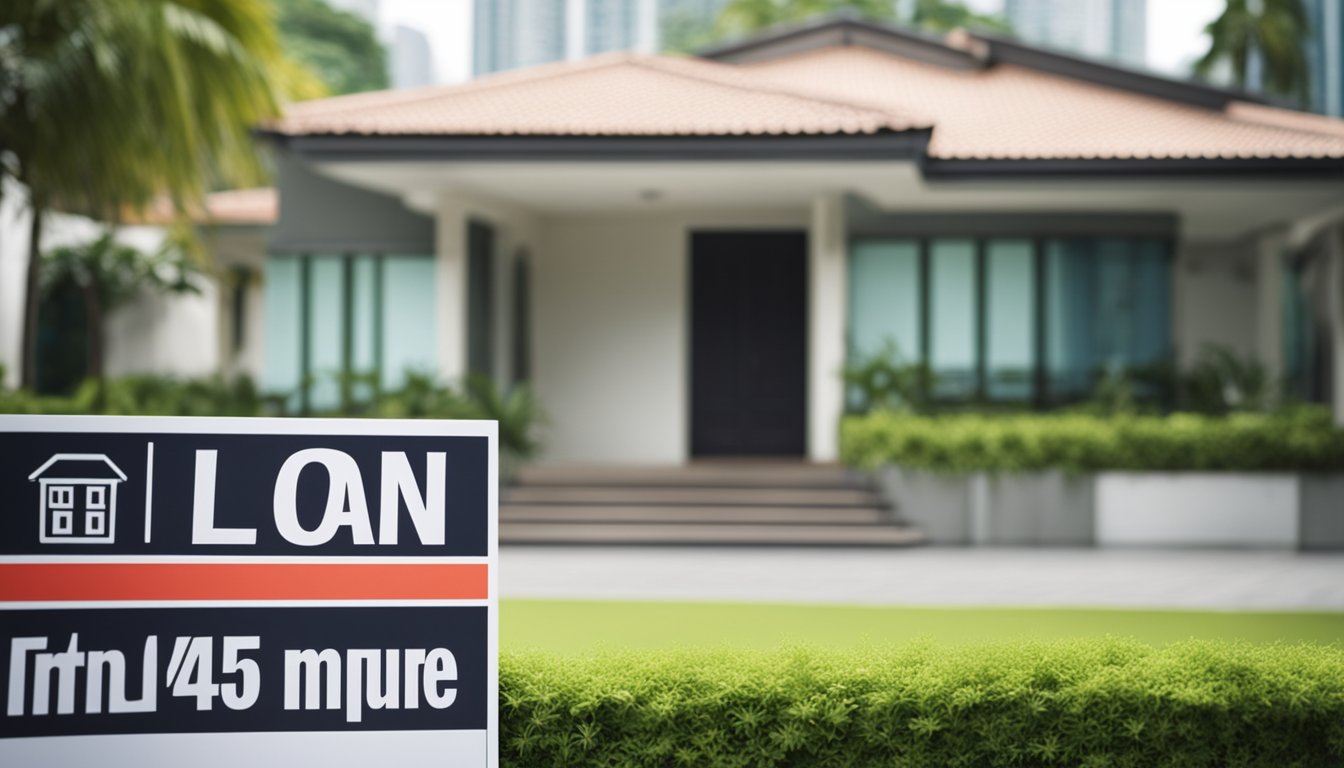
When you take out a mortgage, you’ll need to decide on the loan tenure, which is the period over which you’ll repay the loan. The loan tenure can affect the amount of the monthly instalment and the total amount of interest you’ll pay over the life of the loan.
Maximising Loan Tenure
One way to reduce the monthly instalment is to choose a longer loan tenure. However, this also means that you’ll be paying more interest over the life of the loan. Moreover, if you’re taking out a loan from a bank, the maximum loan tenure is usually 35 years, while for HDB loans, it is 25 years.
Loan Tenure and Refinancing Options
If you’ve already taken out a loan with a shorter tenure, you can consider refinancing to a longer loan tenure. This can help to reduce your monthly instalment and improve your cash flow. However, you’ll need to be aware that refinancing usually incurs additional costs, such as legal fees, valuation fees, and processing fees.
When refinancing, you’ll also need to consider the Loan-to-Value (LTV) ratio. LTV limits the amount of loan you can borrow based on the value of the property. For instance, if the LTV limit is 80%, and the property is valued at £1,000,000, the maximum loan you can borrow is £800,000.
In conclusion, when choosing a loan tenure, you need to balance your cash flow needs with the total interest you’ll pay over the life of the loan. If you’re considering refinancing, you’ll need to be aware of the additional costs and the LTV ratio.
Debt Servicing Ratios and LTV
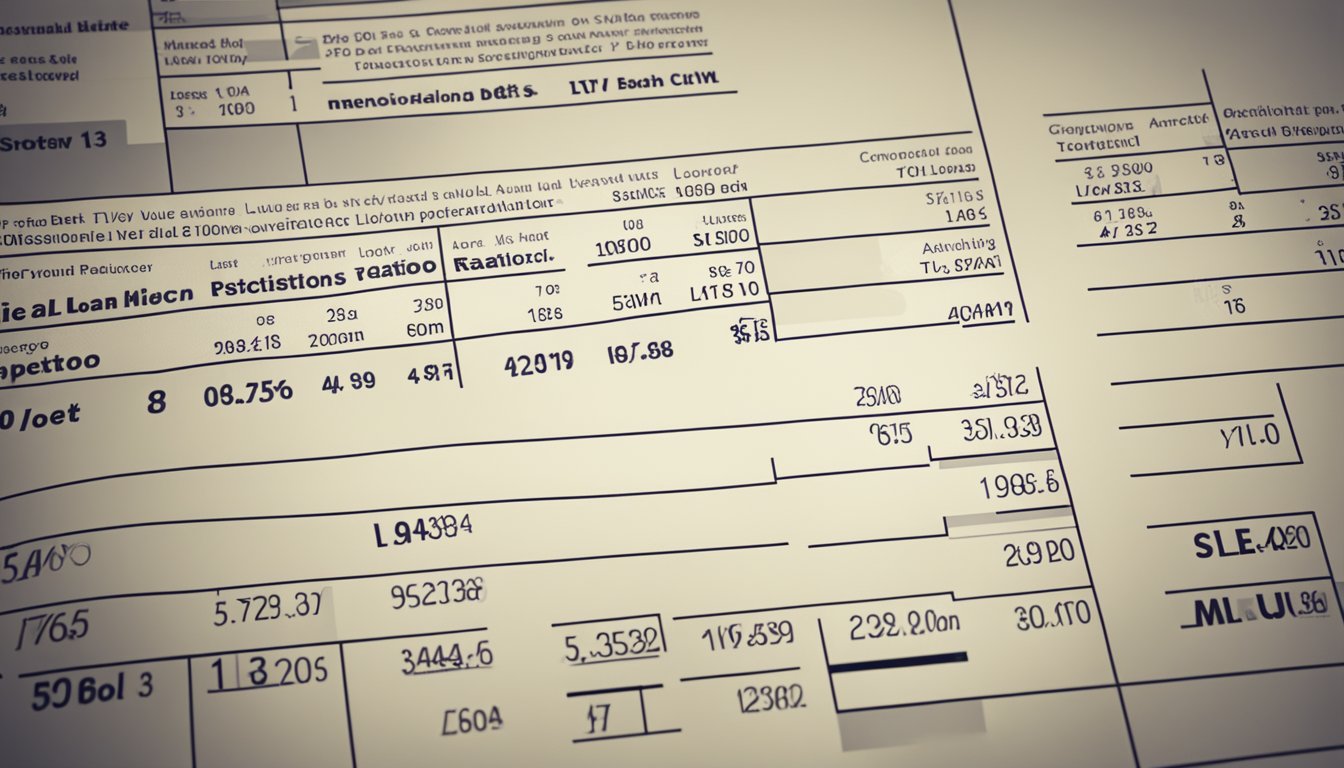
If you’re planning to buy a property in Singapore, you need to be aware of the different ratios that lenders use to determine your eligibility for a loan. Two of the most important ratios are the Total Debt Servicing Ratio (TDSR) and the Mortgage Servicing Ratio (MSR). These ratios are closely related to the Loan-to-Value (LTV) ratio.
Total Debt Servicing Ratio (TDSR) and LTV
The TDSR is a measure of your ability to service all your debt obligations. It takes into account all your existing debt, including credit card debt, car loans, and personal loans, as well as the proposed mortgage payments. The TDSR is expressed as a percentage of your gross monthly income. In Singapore, the maximum TDSR is 60%.
When it comes to the LTV ratio, the TDSR is important because it affects the maximum loan amount you can receive. If your TDSR is high, the lender may be reluctant to lend you the full amount you need to purchase the property. This is because a high TDSR indicates that you may have difficulty servicing your debt obligations.
Mortgage Servicing Ratio (MSR) and LTV
The MSR is a measure of your ability to service your mortgage payments. It takes into account your gross monthly income and the proposed mortgage payments. In Singapore, the maximum MSR is 30%.
The MSR is important when it comes to the LTV ratio because it is used to determine the maximum loan amount you can receive for a property that is not an HDB flat. If the MSR is high, the lender may be reluctant to lend you the full amount you need to purchase the property.
In summary, the TDSR and MSR are important ratios that lenders use to determine your eligibility for a loan. They are closely related to the LTV ratio, which is the proportion of the property’s value that you’re allowed to borrow to finance the property. If your TDSR or MSR is high, the lender may be reluctant to lend you the full amount you need to purchase the property, which may affect the LTV ratio. Therefore, it’s important to keep your debt obligations in check and ensure that you can comfortably service your mortgage payments.
LTV for Different Borrower Profiles
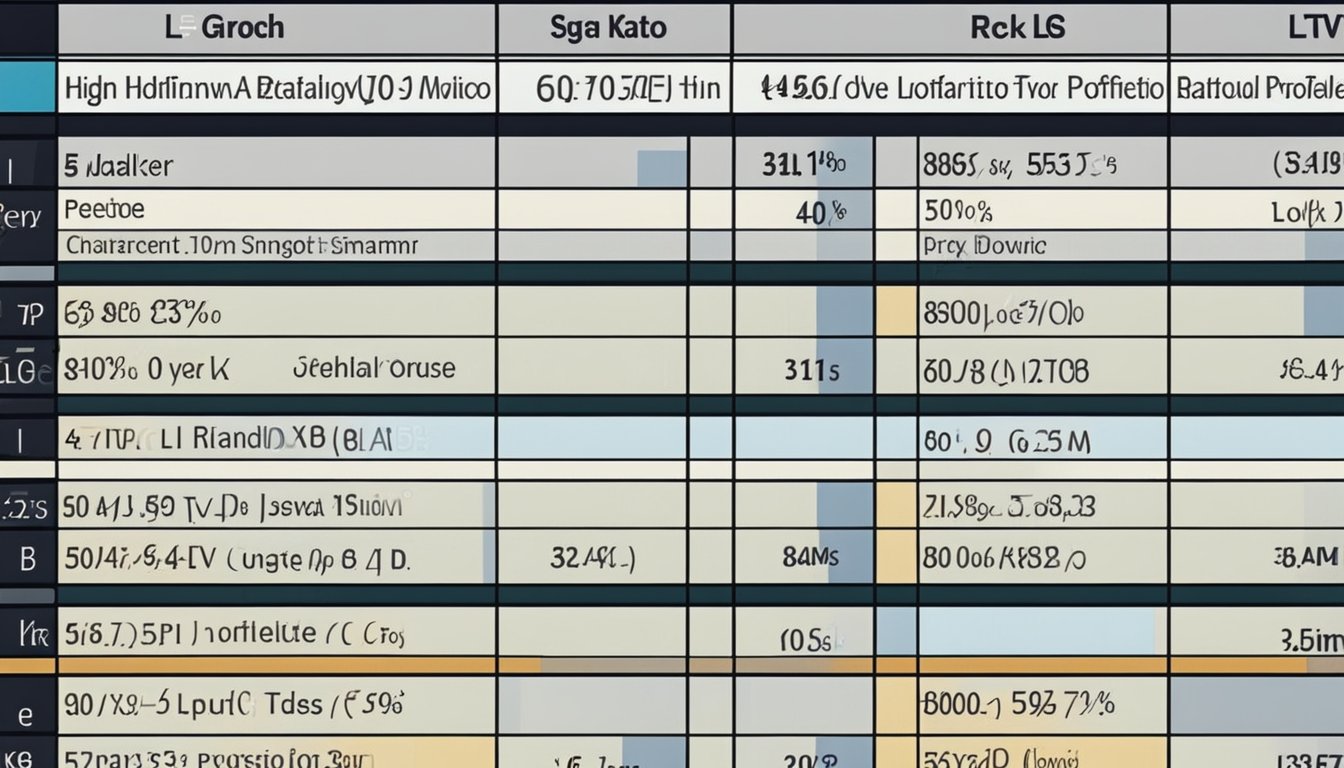
Are you a first-time home buyer or an investment property buyer? The loan-to-value (LTV) ratio for your property purchase will depend on your borrower profile.
First-Time Home Buyers
If you are a first-time home buyer, you can apply for a Housing and Development Board (HDB) housing loan or a bank loan. HDB loans have a higher LTV ratio of up to 85%, which means you can borrow up to 85% of the property value. Bank loans, on the other hand, have a lower LTV ratio of up to 75%.
To qualify for an HDB loan, you must meet certain eligibility criteria, such as being a Singapore citizen or permanent resident and having a household income below a certain threshold. Bank loans, on the other hand, are subject to the bank’s credit assessment and may require a higher down payment.
Investment Property Buyers
If you are an investment property buyer, you can only apply for a bank loan. The LTV ratio for investment properties is generally lower than that for owner-occupied properties. Most banks offer an LTV ratio of up to 75% for investment properties.
To qualify for a bank loan for an investment property, you will need to meet the bank’s credit assessment criteria. This may include having a good credit score, a stable income, and a low debt-to-income ratio.
It is important to note that the LTV ratio is not the only factor that lenders consider when approving a loan. Other factors, such as your credit score, income, and debt-to-income ratio, also play a role in determining your eligibility for a loan and the interest rate you will be charged.
In summary, the LTV ratio for your property purchase will depend on your borrower profile. If you are a first-time home buyer, you can apply for an HDB loan or a bank loan, while investment property buyers can only apply for a bank loan. It is important to understand the eligibility criteria and credit assessment requirements for each type of loan to determine which option is best for you.
Alternative Financing Options

If you are unable to secure a housing loan due to a low LTV ratio, there are alternative financing options available to you. These options include personal loans and car loans.
Personal Loans and LTV
Personal loans are unsecured loans that can be used to finance various expenses, including property purchases. While personal loans are not specifically designed for property purchases, they can be used to increase your down payment, which in turn can increase your LTV ratio.
However, personal loans typically have higher interest rates than housing loans, which means that you will end up paying more in interest over the long term. Additionally, personal loans have shorter repayment periods, which means that you will need to make larger monthly payments.
Car Loans and Property LTV
Another alternative financing option is to take out a car loan. Car loans are secured loans that use your car as collateral. Like personal loans, car loans can be used to increase your down payment and improve your LTV ratio.
However, taking out a car loan can have its drawbacks. For one, car loans typically have shorter repayment periods than housing loans, which means that you will need to make larger monthly payments. Additionally, if you default on your car loan, your car may be repossessed by the financial institution.
While these alternative financing options can help you increase your LTV ratio, it is important to carefully consider the terms and conditions of each loan before making a decision. Make sure to compare interest rates, repayment periods, and other fees to ensure that you are getting the best deal possible.
Understanding Valuation and LTV

If you’re planning to buy a property in Singapore, you’ll need to understand how property valuation works and how it affects your loan-to-value (LTV) ratio.
Property Valuation Process
Property valuation is the process of determining the value of a property. This is usually done by a professional valuer who takes into account a variety of factors, including the property’s location, size, age, condition, and recent sales of similar properties in the area.
Once the property has been valued, the valuer will provide a report that includes the estimated value of the property. This value is important because it determines the maximum amount you can borrow for your property purchase.
Valuation’s Effect on LTV Ratio
Your LTV ratio is the amount of money you can borrow as a percentage of the property’s value. For example, if the property is valued at £500,000 and you’re applying for a loan of £375,000, your LTV ratio would be 75%.
The higher the property’s value, the more you can borrow, and the lower your LTV ratio will be. On the other hand, if the property is valued lower, you’ll be able to borrow less, and your LTV ratio will be higher.
It’s important to note that different lenders have different LTV ratios, and these ratios can also vary depending on the type of property you’re buying. For example, HDB loans have a higher LTV ratio of 85%, while bank loans have an LTV ratio of 75%.
Understanding the valuation process and how it affects your LTV ratio is crucial when applying for a property loan in Singapore. By having a good understanding of these concepts, you can make informed decisions about the property you want to purchase and the loan you need to finance it.
LTV and Risk Management

As a borrower, you need to understand the concept of Loan-to-Value (LTV) ratio, which is a crucial tool for lenders to assess the risk associated with lending money. LTV ratio is the percentage of the loan amount to the appraised value of the property. The higher the LTV ratio, the higher the risk for the lender.
LTV as a Risk Assessment Tool
Lenders use LTV ratio to determine the amount of risk associated with a loan. A high LTV ratio means that the borrower has less equity in the property and is more likely to default on the loan. Therefore, lenders tend to charge higher interest rates for high LTV loans to compensate for the increased risk.
Managing Financial Risk with LTV
As a borrower, you can manage your financial risk by understanding the LTV ratio and making sure that you have enough equity in the property. You can do this by making a larger down payment or by choosing a property with a lower purchase price. By doing so, you can reduce the LTV ratio and increase your chances of getting a lower interest rate.
Lenders also use LTV ratio to manage their financial risk. They limit the LTV ratio to reduce the risk of default. In Singapore, the LTV limit for bank loans is set at 75%, while HDB loans have an LTV of 85%. These limits ensure that borrowers have enough equity in the property and reduce the risk of default.
According to the latest data, outstanding housing loans in Singapore have increased by 1.3% in 2023 to SGD 213.7 billion. With such a large amount of outstanding loans, managing financial risk is crucial for both borrowers and lenders. Understanding the LTV ratio and its role in risk management is essential for all parties involved in the borrowing process.
Frequently Asked Questions

What’s the max amount you can borrow for a private property in our sunny Singapore?
If you’re planning to buy a private property in Singapore, you can borrow up to 75% of the property’s value from a bank. However, do note that the loan amount you get approved for will depend on a number of factors, such as your credit score, income, and other financial commitments.
How does the LTV limit change for your second property purchase? Get the scoop!
If you’re purchasing a second property in Singapore, the LTV limit is lower compared to your first property purchase. For a second property, you can only borrow up to 45% of the property’s value from a bank. This is to discourage property speculation and to ensure that property buyers are not overleveraged.
Are there any age restrictions for housing loans that might affect your LTV? Find out now!
Yes, there are age restrictions for housing loans in Singapore. If you’re below 21 years old, you won’t be able to apply for a housing loan. Additionally, if you’re above 65 years old, the loan tenure will be shorter, which means that your LTV will be lower.
Curious about the latest LTV guidelines for HDB flats? We’ve got the deets!
For HDB flats, the LTV limit is higher compared to private properties. You can borrow up to 90% of the property’s value if you’re taking a loan from HDB. However, do note that this LTV limit is subject to change, so it’s always best to check with HDB for the latest guidelines.
What does a smashing LTV mean for your property financing? Let’s explore together!
A high LTV means that you can borrow a larger amount of money to finance your property purchase. However, do note that a high LTV also means that you’ll have a higher monthly repayment amount, which can be a strain on your finances. It’s important to carefully consider your financial situation before taking on a high LTV loan.
How long can your loan tenure be? Dive into the details for property loans in Singapore!
The loan tenure for property loans in Singapore can be up to 35 years, depending on your age and financial situation. However, do note that a longer loan tenure means that you’ll be paying more interest over the years, which can add up to a significant amount. It’s important to find a loan tenure that’s comfortable for you and your finances.

